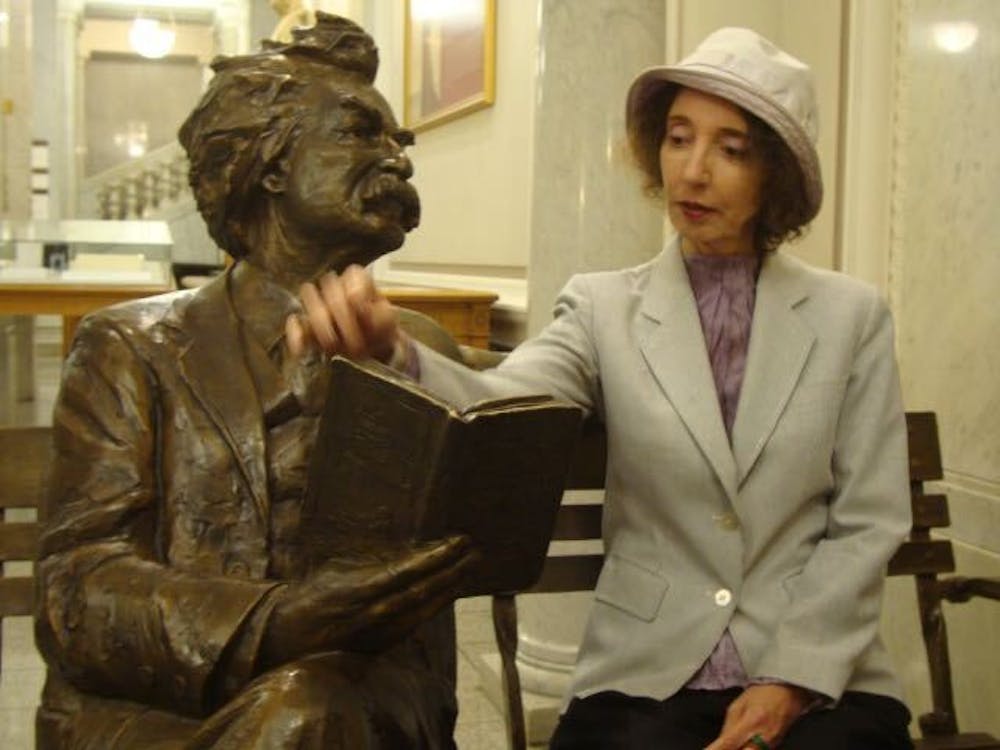Content warning: The following article contains references to sexual assault, rape, and police brutality.
As a high school senior traipsing through AP English Literature class, I was regularly assigned passages of notable literary prose — one, two paragraphs at most — to scrutinize and analyze. It was in this way, somewhat unexpectedly, that I first stumbled upon the work of the great American novelist — and famed Princeton faculty member — Joyce Carol Oates.
The prose in question was an excerpt from Oates’ 2004 short story “Spider Boy,” originally published in The New Yorker and republished in the collection “High Lonesome”; the paragraph in question painted a portrait of the protagonist’s father, a (former) New Jersey state senator.
Perhaps it’s because I was assigned to painstakingly close read that paragraph at least 10 times, but something about Oates’ writing lodged itself in my mind: the text was snappy, supple, and eagerly rhythmic; the repetition of sentence structures was joyfully symmetrical, yet the paragraph contained a hint of something darker, something more pernicious in the esteemed senator. Oates’ opening sentence was “Here was a man to be trusted” — and the unsettling details in the following sentences screamed reasons why the man was not, in actuality, to be trusted.
I’m sad to say that “Spider Boy” was the only fraction of Oates’ writing I had read until I arrived at Princeton. One may be forgiven for only being familiar with a paragraph of Sylvia Plath (who only wrote a single novel) or Harper Lee (who I’d like to pretend only wrote a single novel). However, this isn’t the case for Oates, an amazingly prolific writer with well over 50 novels — not to mention countless short stories, poems, and book reviews — to her name. Indeed, I long viewed only being familiar with a single paragraph of Oates’ as an egregious oversight on my part.
Yet perhaps that one paragraph contained enough of Oates that my unfamiliarity didn’t matter as much as I thought it would. Oates is a master at finding horror in the ordinary: her most famous short story, the 1966 “Where Are You Going, Where Have You Been?” describes a girl kidnapped (and then presumably sexually assaulted) on a perfectly normal, sunny Sunday afternoon. Despite the fact that “Spider Boy” and “Where Are You Going, Where Have You Been?” were written decades apart, the sense of dread and dark foreboding carries over seamlessly between the two stories: namely, in “Spider Boy,” our erstwhile senator rapes and murders homeless young men between legislative sessions at the state capitol. The excerpt of “Spider Boy” I had read, then, seemed quintessentially Oates.
The darker tones that Oates weaves in her stories are also often grounded in societal issues. Oates’ 2020 novel, “Night. Sleep. Death. The Stars.” for example, details a family reeling in the aftermath of the murder of one of its members at the hands of police brutality.
In a series of emails I exchanged back and forth with Oates in February of this year, I was curious about how the author views and addresses the world around us. Is Oates trying to make explicitly political statements through her body of work?

Oates doesn’t think so — but her approach to social and cultural issues has changed significantly through her career. One of Oates’ earliest novels, “them,” also details racial injustice, but against the backdrop of the 1967 Detroit Riots instead of a police stop. “them” is written in an almost apathetic third-person narrator’s voice, whereas “Night. Sleep. Death. The Stars.” focuses on one character at a time, describing much of a character’s inner monologue. The choice is no coincidence — and reflects Oates’ evolving approach to writing about current issues.
“I no longer ‘narrate’ a work of fiction in my own voice but rather through mediated voices — the distinctive voices of the characters who inhabit the fiction,” Oates told me. “Whether the fictional perspective is first-person or third-person, the ‘voice’ is mediated through the particularity of character; it is not an objective or omniscient voice.”
Indeed, thanks to a narrative voice centered around specific characters, Oates has subtly shifted how she discusses social issues: her work no longer appears to comment on humanity as a whole, but rather on individual humans.
“My focus is on persons, ‘characters,’ and not on political or cultural issues,” she said. “I am not a journalist or propagandist; I am keenly interested in human personality.”

Yet examining human personality without considering the wider world — and its systemic failings — can often fail to capture the full context behind an issue. In looking toward a new generation of writers, Oates recognized and acknowledged the need to address political and cultural issues head-on: “If there is anything advantageous about this time in our history, it’s that undergraduates are forced to acknowledge their place in the world — in the ‘real’ world of climate change, unpredictable pandemics, bitter political division & the endangerment of democracy — [and] think [and] write with passion about such issues, which previous generations were inclined to ignore,” she said. “I am always impressed with student writers [who] can absorb into their works of fiction such impersonal or transpersonal issues as these.”
Oates should know about the next generation of writers; she has taught in the Program in Creative Writing at Princeton since 1978, mentoring and guiding students for well over four decades. Although Oates formally retired in 2014, she continues to run much-coveted, 10 person seminars. She will teach yet another fiction writing class next fall.
What changes, then, has Oates seen throughout her years teaching creative writing? The answer surprised me: not much, apparently.
“It may be surprising to say this but writers are so individual, [and] talent [is] so highly specialized, there is really not much difference between my students of the 1980s [and] students in 2022,” she said. “The ‘born writer’ is a certain sort of personality, [and] resists generalities or reductive classification. The very best students in any generation have more in common with one another than they do with their larger cohort.”
The only change, Oates said, is a willingness to face “distressing facts of contemporary life” — such as climate change, pandemics, and political upheaval.
At the same time, though, just as her students and the University have learned much from Oates, Oates has learned much from the Princeton community.
For one, living in Princeton has undeniably influenced her writing. Not only is Oates’ 2013 novel “The Accursed” explicitly set in the town, but her 1989 novel “American Appetites” and 2001 novel “Middle Age: A Romance” also both have settings strongly resembling Princeton, as Oates herself pointed out. “A Princeton Idyll,” a short story, is also set in Princeton and centers around the Institute for Advanced Study.
Beyond her writing, Oates remains an active participant in Princeton’s literary community. She lamented that “much has been lost” during the course of the pandemic and reminisced over public readings from the likes of Stephen King to Margaret Atwood. Oates is cautiously optimistic for the return of the community’s pre-pandemic vitality — but conceded that “any expectation of large, public events in McCosh 50 may be quixotic right now.”
And, perhaps most importantly, Oates’ students have managed to leave their own mark on the author. “I have been impressed by the idealism of Princeton students, as well as their wonderfully diverse imaginations [and] determination,” she said.
I would be remiss, finally, not to mention this fortuitous coincidence: one of my favorite short story collections is Ted Chiang’s imaginative and dazzling sci-fi anthology, “Exhalation.” I was delighted to find out that, at one point, Oates had reviewed Chiang’s collection in The New Yorker. Oates is not traditionally known as a science fiction writer, but as I read her review of “Exhalation,” I found myself falling in love with Chiang’s writing — and sci-fi as a whole — all over again. Through Oates, I found new joy in the same, old writing. I discovered new observations I had neglected to realize before; I considered each short story with a more critical eye in light of Oates’ assessments.
In that moment, I found myself wondering if I was admiring Oates’ ability to explain, analyze, and criticize a body of work — to teach it, essentially — or if I was admiring Oates’ sharp, marvelously enjoyable writing within the review itself.
Then I realized perhaps it didn’t matter: Oates the teacher and Oates the writer are one and the same. It is, after all, our utmost privilege to have all of Joyce Carol Oates.
Joshua Yang is a Contributing Writer for The Prospect at the ‘Prince.’ He can be reached at joshuayang@princeton.edu or on Twitter at @joshuaqyang.








